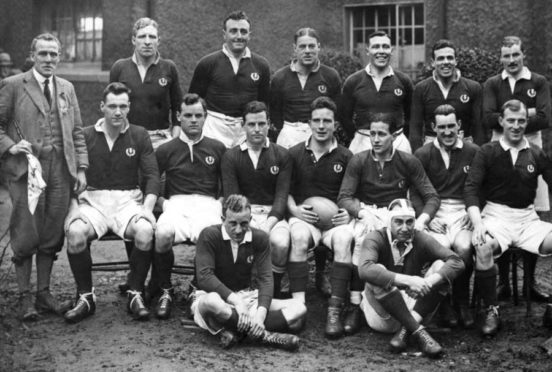The days have long gone when Scotland’s rugby team featured characters from every part of the country, stretching from the Highlands all the way down to the Borders.
And, when Gregor Townsend takes his squad to London for the start of the 2021 Six Nations Championship next week, he won’t be the only person to wonder why so little has been done to boost the sport in places such as Aberdeen and Inverness.
After all, it’s not as if the SRU have never been blessed with international talent from these places, not least when their personnel recorded their first-ever victory at Twickenham in the year of the General Strike.
The venue has become a graveyard for Caledonian ambitions with just four wins in over a century – in 1926, 1938, 1971 and 1983 – and nobody is still with us who witnessed the first of these triumphs. But it was an occasion well worth celebrating.
Looking back now, there was no sense of foreboding as that contest approached. On the contrary, having secured their maiden Grand Slam success the previous season, redoubtable customers in the mould of Ian Smith, Dan Drysdale, Jimmy Ireland and John Bannerman embraced the trip to London with a mustard-keen relish.
The team left Glasgow’s Central Station on the Friday night, after finishing work, and their tactics were confined to a brief pre-match discussion, prior to the main event.
If it sounds basic it was, and the hardy Highlander Bannerman, whose father from South Uist wrote the popular folk song Mairi’s Wedding, once asked a colleague on the train through to Murrayfield: “Who is it we are playing today, Ireland or Wales?”
Yet, once they stepped gaily on to the pitch, these fellows were giants of the game and while Bannerman may not have been a stickler for punctuality or remotely interested in rigorous analysis of opponents, he participated in 37 consecutive matches, all but one of them in the Five Nations Championships, between 1921 and 1929.
More remarkably, he celebrated no less than four victories over the English, the last of them as captain. From this distance, such riches seem implausible, but the afternoon of that maiden triumph was typical of the domination which a terrific group of backs and a coruscating pack enjoyed over their traditional foes.
Straight from the outset, they grabbed the initiative, with tries from Smith and Waddell and a drop goal (which was then worth four points) from Jimmy Dykes. The Scots led 14-3 at the interval, with The Times marvelling at the “quicksilver pace” of the visitors and the swiftness with which they passed the ball through their hands.
Although England, cheered on by their fans, rallied upon the resumption, another Smith try sealed a 17-9 success and nobody could argue that they didn’t merit their win. Their backs had sparked havoc on a regular basis, fuelled by a rich stream of possession from their pack who maraused round the paddock without any sign of fatigue .
This, of course, was in the days when rugby union was a strictly amateur pursuit, when anybody who switched codes to league was consigned to pariah status, and when many of the administrators behaved like Captain Mainwaring in Dad’s Army.
At the denouement of that barnstorming Twickeham clash, the legendary hooker, Jimmy Ireland, exchanged jerseys with his opposite number, Sam Tucker. The two men were friends and it was a spontaneous gesture of solidarity and respect.
But no matter, he was later billed for 12/6 by the SRU!
Nonetheless, the Scots headed home as conquering heroes and Bannerman regaled his confreres with a selection of Gaelic songs, which intimated there was no better feeling than beating the English in their own backyard.
The redoubtable lock forward was imperious in leading the rout at Twickenham, and according to his grandson, Shade Munro, another ex-internationalist, he genuinely bristled with purpose and commitment whenever he pulled on his country’s jersey.
He said: “I have a picture of him skippering the Scots to victory at Murrayfield and the pride in his eyes is absolutely immense.
“In these days, the Five Nations journeys down to England were grand occasions, and although my grandad always offered 100% in his nation’s cause, he would prepare even harder for the Calcutta Cup. There were quite a few Gaelic speakers in the side and they didn’t half work themselves up for these contests. But it definitely paid off.
“Four victories in five years was a pretty amazing record and we would certainly take another result like that of 1926 next week, wouldn’t we?”
Bannerman – a Liberal politician who later became Baron Bannerman of Kildonan – succumbed to lung cancer in 1969, but he was passionate about his Gaelic roots and spoke about the benefit of sport all his life.
It would be nice to imagine there will be more north men in his mould creating similar headlines in the future. But, at the moment, it seems a forlorn prospect.
